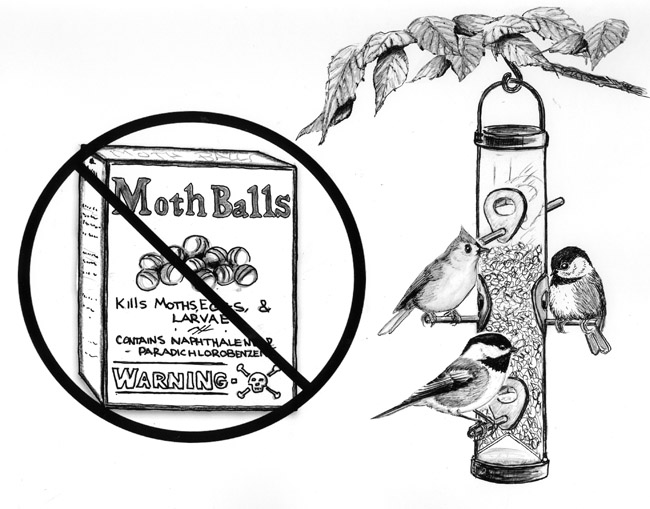
Dear Bird Folks,
I’ve heard that mothballs repel squirrels. Would it be safe for the birds if I put mothballs in my feeders? Please advise.
– Betty, Massapequa, NY
Thank you, Betty,
Thank you for writing to me before you acted on your mothball hypothesis. I can tell you right off the top that it’s not a good idea. Although you are not alone in your radical squirrel prevention proposal. You would not believe the crazy, and often malicious, things people have done in the name of squirrel deterrence. I’ve heard stories of electrified birdfeeders and catapults that are designed to send squirrels flying. I’ve even seen squirrel Voodoo dolls. (Believe me, they don’t work, or at least mine didn’t). I know I’ve said this before, but bird feeding isn’t a hobby for everybody. If it becomes too upsetting, then collect stamps, because there’s no justification for being cruel to any creature, especially in the name of saving a little birdseed. Okay, I’m off my soapbox. On to mothballs.
To begin with, mothballs don’t repel squirrels, so using them would be a waste of time. How do I know, you ask? Here’s how. My old neighbor, Ralph, kept his birdseed in a shed, where he thought it would be safe. However, Ralph’s shed had a dirt floor so the squirrels simply tunneled their way in and ate the seed. (Ralph was mad, but I thought it was funny.) Ralph then filled the tunnel with an entire box of mothballs. The next day mothballs were scattered everywhere. Ralph’s yard looked like the Easter egg roll on the South Lawn of the White House. The squirrels had merely held their noses, slapped the stinky mothballs out of their way and scampered down the tunnel. Once again, Ralph’s birdseed was eaten. He got madder and, of course, I thought it was funnier.
Mothballs are not the answer, Betty. But even if by some miracle mothballs were a squirrel-deterrent, they should not be used anywhere near birdseed…or near anything else for that matter. Mothballs are evil. They are round balls of poison that are not healthy for children and other living things. Oh sure, mothballs were all the rage during the early part of the last century, but so were DDT and cigarettes. Now we know better. How bad are mothballs? My Great Aunt Agnes used to store her clothes in mothballs and now she’s dead. I’m sure Agnes would be a healthy one-hundred-thirty-six-years-old today if it weren’t for those darn mothballs.
So what makes mothballs so awful? Many of them contain a wonderful substance called, “naphthanlene.” Exposure to large amounts of naphthanlene can cause hemolytic anemia, a condition that produces restlessness, fatigue and pale skin. (OMG! That sounds like me. I knew I shouldn’t have hugged my Great Aunt Agnes.) Other types of mothballs contain something with the ridiculous name of “paradichlorobenzene.” If pets ingest these mothballs they can end up with liver and kidney damage. But even if they aren’t eaten, mothballs are fumigants. This means their nastiness is spread through the air and both naphthanlene and paradichlorobenzene are thought to be carcinogenic. (Suddenly having a squirrel eat a bit of birdseed doesn’t seem so bad, does it?)
Right now you are thinking, “Okay, I get it. Mothballs are bad, but how do I feed the birds without having the squirrels dominate my feeders?” The answer is simple: Just buy a squirrel-proof feeder. I realize saying the word “squirrel-proof” invites sarcastic laughs and headshakes. It’s like saying you found a perfect diet or that CNN reported a story and got its facts correct, but believe it or not, there are a few very effective feeders on the market. The most popular model is called the “Squirrel Buster,” made by the Brome Company of Canada. I know it’s a little embarrassing that the Canadians have come up with better anti-squirrel technology than we have, but so what? Our bacon is ten times better than theirs, so it all evens out. It should be noted that there are several American made squirrel-proof feeders that also work fine, but none sell as well Brome’s Squirrel Buster. Squirrel Busters come in different sizes and all of them have been very effective. How effective? We have been selling these feeders for ten years and so far they have been 100% successful against gray squirrels. And believe me, if they weren’t doing the job I’d hear about it. Next to yelling, “bingo!” on Friday night, yelling at me about squirrels is what many people live for.
One note of caution: In case you didn’t notice, in the previous paragraph I wrote the line, “100% effective against gray squirrels.” None of these feeders will keep out red squirrels, chipmunks or raccoons, especially raccoons. The Squirrel Busters are very durable feeders, but raccoons will tear them apart like a kid opening a gift at Christmas. (FYI: Keeping raccoons away from feeders is complicated and expensive. My advice is to bring your feeders in the house at night, when raccoons are most active.)
I’m sure you won’t have any trouble finding a Squirrel Buster in Massapequa, Betty. Lots of places carry them, especially birding stores and many hardware stores as well. However, hardware stores might display their feeders in the same aisle as the mothballs, so be ready to hold your breath. Also, you’d better shop quickly, or you could end up smelling like my Great Aunt Agnes.